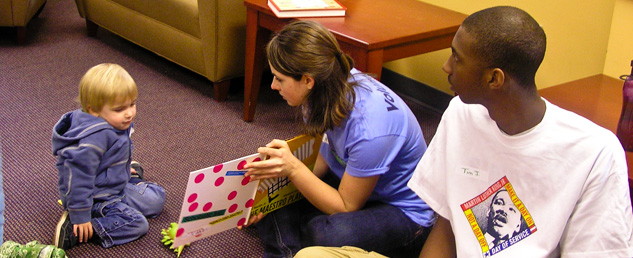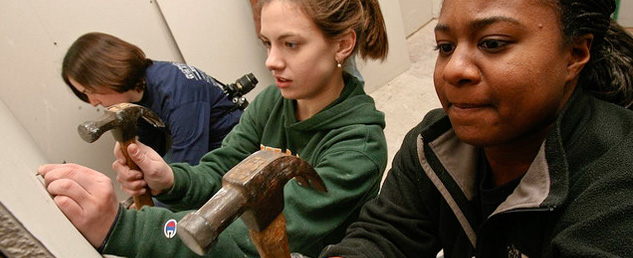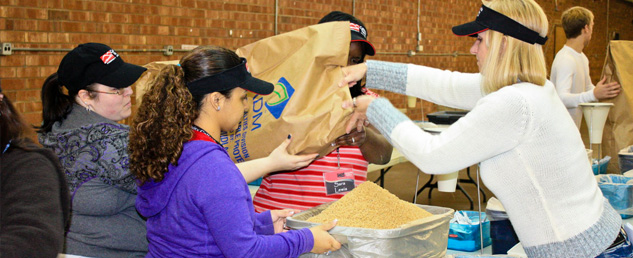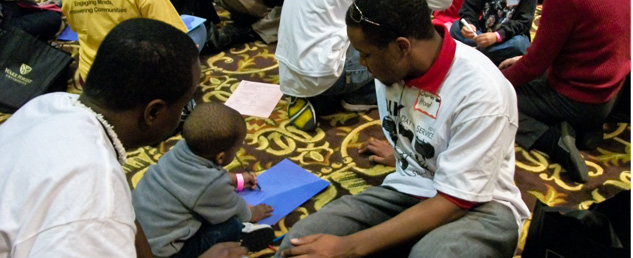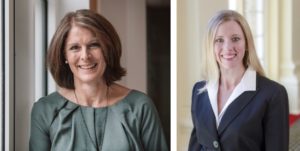
Dr. Margaret Commins of Queens University of Charlotte (L) and Dr. Cara Kozma of High Point University (R) are the 2016-17 Engaged Faculty Scholars.
This month two faculty members in the North Carolina Campus Compact network will begin one-year terms as Engaged Faculty Scholars. Dr. Margaret Commins, an associate professor of political science at Queens University of Charlotte, and Dr. Cara Kozma, an assistant professor of English at High Point University, will be the Compact’s Engaged Faculty Scholars for the 2016 – 2017 academic year.
In this role, both Commins and Kozma will lead a project to deepen the scholarship of campus-community engagement at their own institution, and they will serve as consultants to another campus in the network seeking to expand academic service-learning.
“Faculty who have a track-record of successful service-learning and community-based scholarship make great ambassadors for engaged teaching and learning,” says Leslie Garvin, executive director of North Carolina Campus Compact. “Our intent is to provide support for Dr. Commins and Dr. Kozma to further their own projects, while we leverage their expertise and enthusiasm to strengthen the network.”
At Queens University, Maggie Commins is associate professor of political science and co-chair of the university’s Academic Civic Engagement Task Force. She promotes civic engagement by bringing students into the Charlotte community to conduct election exit polls, collect voter opinion surveys, and design community forums on political issues. As a scholar of US/Latin American Relations, she has a particular interest in refugee and immigration issues, and her policy courses engage students in service with immigrant communities in Charlotte.
During her Engaged Faculty Scholars term, Dr. Commins will support fellow faculty members as they integrate service learning or civic engagement components in accordance with the university’s new general education curriculum, “Queens Advantage.” The curriculum requires new “learning communities” at the 300 level incorporate such components. In partnership with Queens’ Center for Advancement of Faculty Excellence and the co-curricular Center for Active Citizenship, Commins will promote the use of service-learning as a teaching pedagogy and deliver professional development for faculty teaching these courses.
Dr. Lynn Morton, Queens’s provost and vice-president of Academic Affairs, says the university’s senior leadership team has made enhancing service-learning and civic engagement a “top ten” initiative, and Commins has the “knowledge, drive, enthusiasm, and common sense to lead us to the next steps.”
At High Point University, Cara Kozma is an assistant professor of English and the assistant director of the service learning (SL) program. She offers training and development for faculty teaching SL, oversees the annual assessment of SL courses, and co-directs a community writing center. She teaches SL courses in writing and literature ranging from freshman to senior level, and many of her classes are connected to her interests in community writing and community publishing.
As an Engaged Faculty Scholar, Dr. Kozma will research the impact of service-learning on students from different socioeconomic backgrounds. Studies find that SL classes often make students more tolerant and less prone to stereotyping; however, very little research has been done on how students’ socioeconomic backgrounds affect the learning gains of individual students. In addition to her faculty position, Kozma is assistant director of HPU’s SL program, and she hopes her findings can provide insight into how the program can improve.
Rev. Dr. Joe Blosser, director of HPU’s expanding SL program, says the experience Kozma has gained from being “on the ground floor” of HPU’s SL program development will make her “a huge asset to campuses that are just beginning the work toward institutionalization of service-learning.”
North Carolina Campus Compact’s Engaged Faculty Scholars receive a stipend of $1500, travel reimbursement for consultation visits to the partner institution, and a professional development budget. The scholar’s institution is encouraged to provide a match of cash, course release, or other resources and recognition. The scholars present their projects at the network’s annual PACE Conference and other venues.
For more information about the program, please contact Leslie Garvin.

